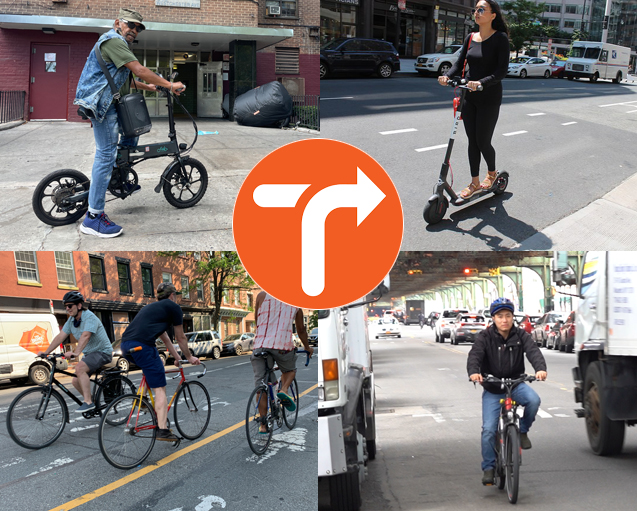The bike boom is now going vroom, vroom.
The Adams administration must seize on the massive growth in electric bikes and other forms of micro-mobility and dramatically build new and expand existing bike lanes to "shift people out of cars," Transportation Alternatives said in a new policy paper to be released today.
The group, plus advocates including Los Deliveristas Unidos, United Parcel Service, Oonee, Open Plans, and WE ACT for Environmental Justice, will gather at 10 a.m. on W. 19th Street and Ninth Avenue in Manhattan to demand changes and discuss their recommendations.
"We must act quickly: while our transportation landscape is already shifting [and] our infrastructure has not kept up," Transportation Alternatives said in its report. "Not only does this mismatch fail to seize the opportunity presented by e-micromobility, it also creates dangerous conditions for all road users, especially the most vulnerable — children, older adults, and those with limited abilities. ... Now is the time to make the major investments that will enable e-micromobility to become a safe, viable option for more New Yorkers.
"We need bold leadership to embrace the transformative growth of e-micromobility," the statement adds.
Success, Transportation Alternatives said, hinges on three pillars:
- More Space: Car-centric streets must be redesigned into spaces for more modes of transport, and the city must create new, dedicated, 20-mile-per-hour lanes and widen existing bike lanes for modes of varying speeds. "By 2025, to meet already existing demand, the city Department of Transportation should widen at least 25 percent of existing lanes," the report states.
- Incentives: The city and state must give New Yorkers financial incentives to shift from cars, plus create secure, on-street parking for e-mobility.
- Safe charging: Like others, including City Council Member Keith Powers, the group is calling for battery trade-in programs and safe public charging.
It is not as if the Adams administration has been standing on the sidelines during the ongoing growth of micro-mobility. Mayor Adams has committed to hardening bike lanes, creating safe charging stations and battery swaps, adding dozens of miles of protected bike lanes and even rolled out the first double-width bike lane along a short stretch of Ninth Avenue earlier this year.
And during a recent press conference on the danger of substandard lithium-ion batteries, Adams refused to take the bait and declare war on the mode of transport. "We know [e-bikes] are convenient, but they also are a necessity, particularly for those who are part of this booming economy of delivering food and other items throughout the city,” he said in March. “[E-bikes] play a major role in help reducing congestion in how we move around the city as we deal with our environmental issues that we are facing."
But the administration is also butting up against the edge of its capacity; it is required by city law to build 50 miles of protected bike lanes (not to mention the 30 miles of dedicated bus lanes), which is practically double what the city has ever created in a single year. It is unclear how much can be accomplished on the Department of Transportation's long list of goals. The agency has tweeted about the growth of cycling, yet concrete plans for wider bike lanes, for example, are elusive, as Streetsblog reported this week.
And the administration opposes at least one of Transportation Alternatives' other proposals daylighting all intersections to create more visibility.
Some of TA's recommendations match what the e-mobility industry itself is pushing. At the National Association of City Transportation Officials convention in Denver this week, four e-scooter companies said that cities need to take control of their streets to ensure that sustainable transportation modes flourish.
“At the heart of our campaign, is the idea that some changes in life, though hard, are ultimately worth it and can make your life better,” said Christian Navarro, head of brand marketing at Lime, adding that scooter use is a great way “to alleviate the headaches of car ownership” and provide “a source of newness, freshness, and … an exciting way to go about your day unburdened.”






